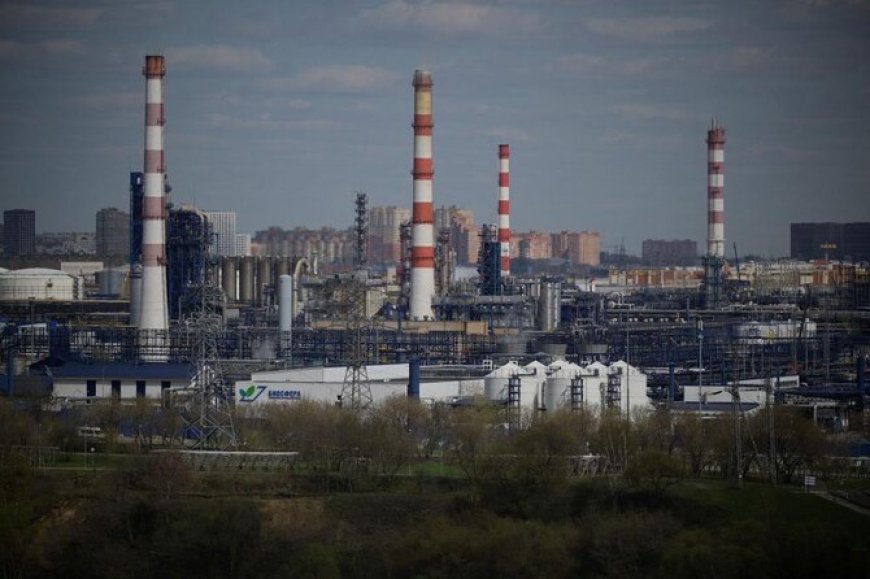US Sanctions Russian Oil in Aggressive Move to Support Ukraine and Shape Diplomatic Leverage
Friday, the Biden government announced its most severe sanctions to date on Russia's critical oil and gas sector in a forceful attempt to weaken Russia's military efforts in Ukraine. Targeting some of Russia's biggest energy businesses, including Gazprom Neft and Surgutneftegas, as well as 183 boats engaged in oil transportation, the sanctions seek to empty Moscow's coffers monthly of billions of dollars.

Friday, the Biden government announced its most severe sanctions to date on Russia's critical oil and gas sector in a forceful attempt to weaken Russia's military efforts in Ukraine. Targeting some of Russia's biggest energy businesses, including Gazprom Neft and Surgutneftegas, as well as 183 boats engaged in oil transportation, the sanctions seek to empty Moscow's coffers monthly of billions of dollars.
The widest since the commencement of the conflict, these actions constitute part of a double strategy meant to bolster Ukraine's position and give incoming President-elect Donald Trump the power required to negotiate a peace agreement in Ukraine. But this audacious strategy begs important issues regarding its viability, consequences for world energy markets, and possible changes in U.S. foreign policy under Trump's leadership.
Attaching Russia's Lifeline
Long the pillar of Russia's economy, the petroleum industry has been vital for military operations finance. Targeting every link in the production and distribution chain to make sanctions disobedience increasingly costly, senior White House economic and national security advisor Daleep Singh said the sanctions "the most significant yet on Russia's energy sector."
Exemptions allowing energy-related transactions with approved Russian banks were revoked, therefore reversing previous exemptions that would have eased Russia's already strained banking sector. Since the invasion started in February 2022, Russia has already seen double-digit inflation and a devaluation of the currency; the Biden government aims to magnify the economic damage done to Russia.
Declaring the actions to be a "significant blow" to Moscow's war operations, Ukrainian President Volodymyr Zelensky praised them. "The less revenue Russia earns from oil, the sooner peace will be restored," he said on a social media post.
World Energy Markets React
With Brent oil prices rising by almost 3%, almost reaching $80 a barrel, the announcement immediately shook world energy markets. Traders expect interruptions in Russian oil deliveries to big consumers like China and India, who have depended on the so-called "shadow fleet" of outdated tankers to evade Western sanctions.
U.S. authorities contend that despite these disturbances the world's oil supply is now more reliable. U.S. assistant secretary for energy resources Geoffrey Pyatt cited fresh oil output from nations such Guyana, Brazil, and Canada as balances to any possible shortfall. "We see ourselves as no longer constrained by tight supply in global markets the way we were when the price cap mechanism was unveiled," Pyatt said Reuters.
Political Calculations and Trump's Part in It
Though the penalties are presented as a necessary step toward peace, their timing also begs questions. These steps provide his government a potent weapon but also a difficult diplomatic conundrum since President-elect Trump will take office on January 20. Trump's advisers have offered ideas including territorial concessions to Russia, which cause worry in Kyiv about a peace accord perhaps costing Ukraine.
Lifting these sanctions under U.S. law would need legislative notification and a possible vote of disapproval, therefore making it challenging for Trump to unilaterally undo Biden-era policy. Reflecting a bipartisan agreement on squeezing Moscow, many Republican legislators have expressed support for the most recent penalties.
Risks and Uncertainties
Although the sanctions seek to reduce Russia's capacity to pay for its conflict, their impact depends on execution and international collaboration. The equation is complicated by Russian oil being diverted to non-Western markets like India and China, as well as by the possibility of raising hostilities with these countries over energy policies.
Furthermore, the effect of the sanctions on common Russians together with the growing financial burden on European partners could jeopardize long-term support for such policies. Targeting Russia's energy industry, according to critics, may unintentionally reinforce hardline groups inside the Kremlin, therefore complicating diplomatic solutions even more.
The Direction Ahead
The most recent penalties reflect both a strategic gamble and a threat to continuity in U.S. foreign policy as the Biden government gets ready to turn over the keys to President-elect Trump. It remains to be seen if they will pave the ground for fresh geopolitical tensions or result in a "just and durable peace," as Biden officials hope.
For now, the world keeps a careful eye as Russia's economic situation gets more dire and diplomatic paths remain rife with doubt. Clearly, the stakes for Ukraine and for the larger international order could not be higher.













































